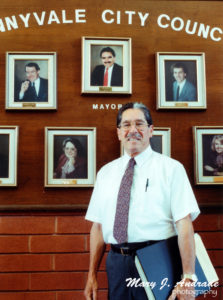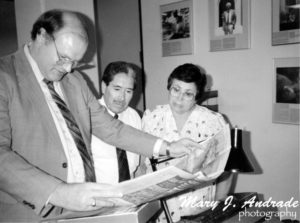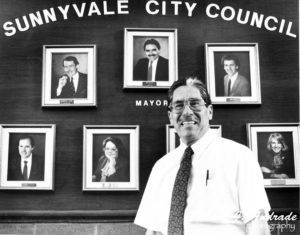
Roberto Herrera Gonzales nació en Morense, Arizona, el 29 de abril de 1926. Su padre era de Jalisco, mientras que su madre nació en Durango, México. Ellos emigraron a los Estados Unidos durante la Revolución Mexicana, entre 1910 y 1915. Vivieron en Los Ángeles y más tarde en el Valle de San Joaquín. Gonzales no terminó sus estudios en la escuela primaria, pues tuvo que trabajar desde muy temprana edad para mantenerse. Aunque experimentó muchas limitaciones por las cuales sufrió mucho, eso dio lugar a que Gonzales se convirtiera en un hombre sensible.
“Las personas de mi generación sufrieron discriminación y salarios bajos. Puedo decir con orgullo que abrimos nuevos caminos para las nuevas generaciones. Tanto con nuestro sufrimiento, como con nuestra determinación, preparamos el terreno para mejorar nuestras vidas y las de generaciones venideras. Verdaderamente es admirable examinar y comprender lo que nuestros padres hicieron en las minas de Arizona y Nuevo México, abrimos el Valle Imperial de California a la agricultura y ayudamos a edificar Los Ángeles. Todos laboramos físicamente, pues no nos permitían hacer uso de nuestra mente”, comentó él.
De los campos, Gonzales fue a trabajar para una compañía de aviación en Arizona. De allí se registró en el servicio militar a los 17 años de edad, participando en las operaciones en el océano Pacífico, durante la Segunda Guerra Mundial. A su regreso, Gonzales fue a trabajar de nuevo en la misma aerolínea. En Arizona conoció a Dolores López, con quien contrajo matrimonio en 1947.
En 1949 se mudó a San Francisco, donde trabajó con la misma compañía de aviación, sin embargo fue llamado a luchar en Corea, pues estaba registrado en el servicio militar de reserva. Sirvió en esa guerra por dos años y después, en 1954, se cambió con su familia a Sunnyvale. Donde vivió en el mismo domicilio.
Su hijo Robert David nació en Tucson y trabajó en el Distrito Escolar de Sunnyvale. Ronald, su segundo hijo nació en San Francisco, participó en el Concilio de Sunnyvale durante ocho años, siendo elegido (al momento de esta entrevista) como Alcalde de Sunnyvale por dos años. Posteriormente, fue Supervisor del Condado de Santa Clara y Alcalde, de la Ciudad de San José. El tercer hijo de Roberto y Dolores nació en 1957, trabajó en una compañía electrónica y sus dos hijas asistían (al momento de esta esntrevista), a la Universidad Estatal de San José.
 Gonzales se envolvió en la comunidad participando en las actividades de la iglesia, enfrentándose a las necesidades de la gente. Esta nueva avenida le abrió los ojos. “Fuimos testigos de las injusticias y decidimos formar comités. Organizamos alianzas como ‘La Raza Unida’ y apoyamos las demandas de los trabajadores del campo. En general, nos envolvimos en la lucha por la justicia social. Hubo víctimas, pero aprendimos a actuar. Descubrimos que éramos necesarios. Aprendimos a usar tácticas de presión, como revisar problemas por medio del estudio. Al final formamos coaliciones y organizaciones”, comentó él.
Gonzales se envolvió en la comunidad participando en las actividades de la iglesia, enfrentándose a las necesidades de la gente. Esta nueva avenida le abrió los ojos. “Fuimos testigos de las injusticias y decidimos formar comités. Organizamos alianzas como ‘La Raza Unida’ y apoyamos las demandas de los trabajadores del campo. En general, nos envolvimos en la lucha por la justicia social. Hubo víctimas, pero aprendimos a actuar. Descubrimos que éramos necesarios. Aprendimos a usar tácticas de presión, como revisar problemas por medio del estudio. Al final formamos coaliciones y organizaciones”, comentó él.
“Nos dimos cuenta que la situación sería diferente para nuestros hijos a través de la educación. Así es que por medio de nuestra participación en el PTA (Organización de Padres y Maestros), en proyectos y programas de justicia social tuvimos entrada. Hemos aprendido sobre los poderes que nos gobiernan, antes no veíamos rostros morenos en los Comités o los Concilios de la Ciudad. Sin embargo, estos poderes gastaban nuestro dinero y hacían decisiones por nosotros, sin pedir nuestra opinión. Entonces decidimos que debíamos participar, aunque no consideraban positivos nuestros esfuerzos. Durante los años sesenta y setentas muchos se convirtieron en nuestros enemigos. Ahora vivimos en un mundo diferente. No necesitamos presionar a nadie, ya que los Comités están listos esperando nuestra participación. Ya no tenemos que pedir, ahora debemos hacerlo nosotros mismos. Necesitamos ser parte del sistema. El poder del voto es tan grande, que una persona que no lo ejercita se está colocando fuera de la comunidad. Los poderes escuchan solamente a los que tienen poder y el momento para ejercer ese poder está aquí”.
Sin duda la lucha de Roberto Herrera Gonzales, así como de tantas personas abrieron camino a las nuevas generaciones. Sin embargo los desafíos continúan en diferentes campos. © La Oferta Newspaper.
<English version>
Roberto Herrera Gonzales was born in Morence, Arizona on April 29, 1926. His father was from Jalisco, his mother from Durango, México. They came to the United States during the Mexican Revolution between 1910-1915. They lived in Los Ángeles and then in the San Joaquín Valley. He didn’t finish the 8th grade because he had to go to work to support himself. The suffering of many limitations made him very compassionate, and also made him want to be able to give better opportunities to his family.

“The people of many generations suffered from discrimination and low wages. I can say with pride that we have opened new ways to the next generations. We paved this way with our suffering and determination to improve our lives and the lives of future generations. It is truly admirable to see what our parents did in the mines of Arizona and New Mexico, how we opened the Imperial Valley in California to agriculture, how we helped to build Los Ángeles. We all did physical work because they didn’t let us use our minds.”
From the fields he went to work in an airline company in Arizona, from there, Roberto Gonzales entered to the military service when he was 17, participating during World War II in the Pacific, and upon return, went back to work in the same airline company. He met his wife Dolores Lopez in Arizona, marrying her in 1947.
In 1949 he moved to San Francisco, still with the same company, and while living there was called to Korea because he was in the military reserves. He served for nearly two years, and then, in 1954 moved his family to Sunnyvale, living in the same house since that year. Roberto and Dolores son, Robert David, was born in Tucson, working for the Sunnyvale School District. Ronaldo was born in San Francisco, he served on the Sunnyvale’ City Council for eight years, twice as Mayor. At the time of this interview Ron Gonzales was a candidate for the position of Supervisor of the County of Santa Clara, District 3. Later he served as Mayor of San Jose. Their son Daniel was born in 1957 and worked in electronics, and their two daughters were attending San Jose State University.
Gonzales started his involvement with the community by participating first with the church, facing the needs of the people. This was an avenue that opened his eyes. “We saw the injustices and decided to form committees, we did coalitions like ‘La Raza Unida,’ we supported the claims of the farm workers; in general, we got involved with social justice. There were victims, but we learned to move, we discovered that we needed to be there. We learned pressure to form coalitions and organizations,” he said.
“In education, we were aware that things were different for our children so through our involvement with the PTA, through projects, federal programs of social justice we were able to give our input. We all learned about the structures that govern us, and when we used to go to the boards or City Hall we never saw brown faces, but they were spending our money, they were making decisions for us, without our opinions. So we decided that we needed to participate. Many people didn’t see our efforts as something positive; we created some enemies during the 60’s and 70’s. Now we live a different time. We don’t need to put pressure because the boards are ready waiting for our participation. We don’t have to ask anymore; we have to do it for ourselves. We need to be part of the system. The power of the vote is enormous, the person who doesn’t exercise that power is putting himself outside the community. People in power listen only to the one who has power. The time is now to use that power.”
Without any doubt, Roberto Herrera Gonzales and many people like him open new doors of opportunities for the new generations. Even though, there are still many issues in the community that people are addressing them now. © La Oferta Newspaper.






